Biloxi Mississippi is a very different place from New Orleans with a very different Katrina story to tell. It's also a place very eager for people to get the facts straight.
The damage in New Orleans was caused not so much by the storm but by the failure of the levees. Biloxi got the full wrath of the storm. While New Orleans was the focus of national attention with its higher profile and its racial issues and endemic corruption, Biloxi was largely ignored. In New Orleans the Lower Ninth got screwed six different ways. In Biloxi, everyone got screwed when insurance companies decided that the damage was caused by flooding and therefore not covered. Never mind that the storm surge was part and parcel of the storm, the insurance companies bailed and got away with it.
In the wake of the storm, casinos that were legal offshore persuaded the state to allow them to build onshore and snapped up all of the prime beach-front real estate. Outside of town along the coast it's a mixed bag. Some homes survived. Some have been fixed up. Others are a still a wreck and some were swept away completely leaving nothing but an empty lot. Services are still a mess, crime is rampant and the economy as a whole has yet to get back to normal.
Habitat in Biloxi is a much more churchly affair. It's an inter-faith Christian organization to begin with but being on Salvation Army property seems to have stiffened their spine. While they paid lip-service to respecting everyone's beliefs they lovde to pray a lot and gave the rest of us no choice but to participate in something we didn't believe in. Not exactly treating others as you would wish to be treated. Nevertheless, we got through it and except for that it was a fun and productive week.
The other big differences with the Habitat set up were that it was a more rigid schedule. You were there for a full week, assigned to a particular crew and worked with them on the same project all week.
Probably the most unusual feature was that the staff and volunteers are housed in a football stadium. It was originally acquired by the Salvation Army to serve as a community center. As luck would have it they acquired it four days before the storm. After the storm, it became clear that its best use was for housing volunteers. The Salvation Army runs it completely at their own at their own expense.
The week I was there was a pretty busy one as many college groups were still on their Christmas break. I was in a kind of porta-home, bigger than a trailer, smaller than a house.
It's divided into mens and womens housing and each has its own showers and bathrooms.
skip to main |
skip to sidebar
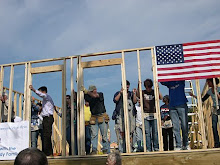


Finally made it!!
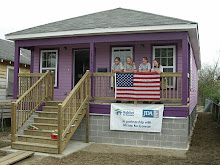

Family receving keys to their new house at dedication ceremony

Americorps Volunteers
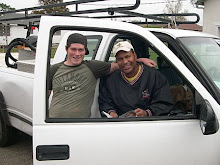
Rory & James

John the Cook

Our accomodations
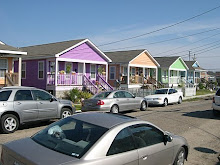
Spankin new colors

Haven't lost their spirit
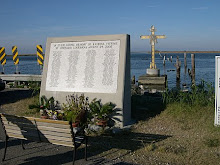
Katrina Memorial

Katrina Memorial

Vacant lots where homes once stood


Biloxi Volunteer Housing

Well coordinated effort

Cheerleaders in Native Dress



Miss Toni & TC (Tom Cruiser)

Bad Hair Day on the Bridge

St Louis Cathedral

Satan Greeting Tourists

Some Idiot on Bourbon St



Finally made it!!


Family receving keys to their new house at dedication ceremony
Habitat Web Pages

Americorps Volunteers

Rory & James

John the Cook

Our accomodations
Musicians Village

Spankin new colors
St Bernard Project

Haven't lost their spirit
Make it Right
Lower Ninth Ward
Photos of the flood
The Aftermath

Katrina Memorial

Katrina Memorial
Gulf Coast Habitat

Vacant lots where homes once stood


Biloxi Volunteer Housing

Well coordinated effort
The French established the first European settlement in the lower Mississippi valley in 1699 at Old Biloxi (now Ocean Springs). New Biloxi, founded in 1719, was the capital of French Louisiana until 1722, when New Orleans replaced it.

Cheerleaders in Native Dress



Miss Toni & TC (Tom Cruiser)

Bad Hair Day on the Bridge
Did you know...
The total miles of canals (above and below ground) in New Orleans exceed that of Venice Italy

St Louis Cathedral

Satan Greeting Tourists

Some Idiot on Bourbon St